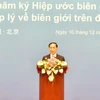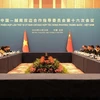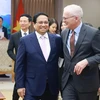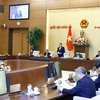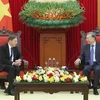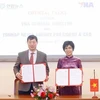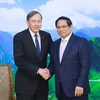Vice Chairperson of the National Assembly Nguyen Thi Kim Ngan has viewed the 2013 Constitution’s regulations on the economic, cultural, educational, scientific and technological and environmental spheres as new steps helping fuel the nation’s path towards comprehensive renewal, intensive and extensive international integration and sustainable development.
Ngan, who is also a Politburo member, has made clear these regulations of the Constitution, which was revised on the basis of the 1992 document and adopted at the sixth session of the 13th National Assembly.
On the plane of economics, the legal document advocates sustainable growth, stating that economic development must be closely combined with cultural development, the exercise of social progress and equity, and environmental protection, Ngan said.
Differing from the previous constitutions, the 2013 Constitution manifests new thoughts about economic sectors, the legislator said, adding that such sectors are no longer detailed in the Constitution but specified in law and other legal documents.
The Constitution stipulates that the State economy is not identical to State enterprises, stressing the former, not the latter, plays the leading role.
It is the first time that the position and role of entrepreneurs and enterprises have been acknowledged in the Constitution, Ngan noted.
The legal document also states that the State shall develop and improve economic institutions, regulate the economy on the basis of respect for market rules; delegate, devolve and decentralise the powers in the state management; promote regional economic links, and ensure the unity of the national economy.
The State represents owners and uniformly manage natural resources owned by all the people so that the natural resources and property are used for the sake of people.
The right to private ownership and the right to inheritance shall be protected by law, the 2013 Constitution prescribes.
The legal property of individuals and organisations engaged in investment, production or business activities is protected by law and is not subjected to nationalisation.
The document regulates that land, water resources, mineral resources, resources in the sea and airspace, other natural resources, and property managed or invested in by the State are public property, owned by all the people, and represented and uniformly managed by the State.
While affirming that land is a special national resource and an important resource for national development, and is owned by all the people, the Constitution says the State may recover land currently used by organisations or individuals in case of extreme necessity prescribed by a law for national defense or security purposes; or socio-economic development in the national or public interest. Land recovery must be public and transparent, and compensation must be paid in accordance with the law.
The State may requisition land in cases of extreme necessity prescribed by a law to perform national defense and security tasks or during a state of war or a state of emergency, or in response to a natural disaster.
According to the lawmaker, the legal document supplements several articles on State budget, national reserve, State financial funds and other public financial resources, which must be uniformly managed by the State and used in an efficient, fair, public, transparent and lawful manner.
Regarding employment, the Constitution states that citizens have the right to work and to choose their occupations, employment and workplaces.
It also prescribes that everyone has the right to health protection and care and to equality in the use of medical services, and has the obligation to comply with regulations on the prevention of disease and medical examination or treatment.
Regarding social welfare, the Constitution states that the State shall create equal opportunities for citizens to enjoy social welfare, develop the social security system, and adopt policies to support elderly people, people with disabilities, poor people, and other disadvantaged people.
Everyone has the right to enjoy and access cultural values, participate in cultural life, and use cultural facilities. The State and society shall care for the creation and development of an advanced Vietnamese culture that is deeply imbued with the national identity and has absorbed the cultural quintessence of humanity.
The legal document says all citizens have the right, as well as the obligation, to learn and that education is the country’s top policy.
Everyone has the right to conduct scientific or technological research, or literary or artistic creation, and to enjoy the benefits brought about by those activities.
The Constitution also stresses that scientific and technological development is the country’s top policy, which plays the key role in socio-economic development.
On environmental protection, the document affirms that everyone has the right to live in a clean environment and has the obligation to protect the environment.
The State shall adopt environmental protection policies; manage and use natural resources in an efficient and sustainable manner; conserve nature and biodiversity; and take the initiative in preventing and controlling natural disasters and responding to climate change.
The NA Vice Chairwoman said the regulations have mirrored the Party and State’s viewpoints and policies as well as people’s aspirations for the country to achieve comprehensive renovation, broader and deeper international integration and sustainable growth on the three pillars of economics, social affairs and environmental protection.
Serving as constitutional grounds, the document provides political and legal safeguards for the country’s socio-economic development in the new periods, Ngan said.-VNA
Ngan, who is also a Politburo member, has made clear these regulations of the Constitution, which was revised on the basis of the 1992 document and adopted at the sixth session of the 13th National Assembly.
On the plane of economics, the legal document advocates sustainable growth, stating that economic development must be closely combined with cultural development, the exercise of social progress and equity, and environmental protection, Ngan said.
Differing from the previous constitutions, the 2013 Constitution manifests new thoughts about economic sectors, the legislator said, adding that such sectors are no longer detailed in the Constitution but specified in law and other legal documents.
The Constitution stipulates that the State economy is not identical to State enterprises, stressing the former, not the latter, plays the leading role.
It is the first time that the position and role of entrepreneurs and enterprises have been acknowledged in the Constitution, Ngan noted.
The legal document also states that the State shall develop and improve economic institutions, regulate the economy on the basis of respect for market rules; delegate, devolve and decentralise the powers in the state management; promote regional economic links, and ensure the unity of the national economy.
The State represents owners and uniformly manage natural resources owned by all the people so that the natural resources and property are used for the sake of people.
The right to private ownership and the right to inheritance shall be protected by law, the 2013 Constitution prescribes.
The legal property of individuals and organisations engaged in investment, production or business activities is protected by law and is not subjected to nationalisation.
The document regulates that land, water resources, mineral resources, resources in the sea and airspace, other natural resources, and property managed or invested in by the State are public property, owned by all the people, and represented and uniformly managed by the State.
While affirming that land is a special national resource and an important resource for national development, and is owned by all the people, the Constitution says the State may recover land currently used by organisations or individuals in case of extreme necessity prescribed by a law for national defense or security purposes; or socio-economic development in the national or public interest. Land recovery must be public and transparent, and compensation must be paid in accordance with the law.
The State may requisition land in cases of extreme necessity prescribed by a law to perform national defense and security tasks or during a state of war or a state of emergency, or in response to a natural disaster.
According to the lawmaker, the legal document supplements several articles on State budget, national reserve, State financial funds and other public financial resources, which must be uniformly managed by the State and used in an efficient, fair, public, transparent and lawful manner.
Regarding employment, the Constitution states that citizens have the right to work and to choose their occupations, employment and workplaces.
It also prescribes that everyone has the right to health protection and care and to equality in the use of medical services, and has the obligation to comply with regulations on the prevention of disease and medical examination or treatment.
Regarding social welfare, the Constitution states that the State shall create equal opportunities for citizens to enjoy social welfare, develop the social security system, and adopt policies to support elderly people, people with disabilities, poor people, and other disadvantaged people.
Everyone has the right to enjoy and access cultural values, participate in cultural life, and use cultural facilities. The State and society shall care for the creation and development of an advanced Vietnamese culture that is deeply imbued with the national identity and has absorbed the cultural quintessence of humanity.
The legal document says all citizens have the right, as well as the obligation, to learn and that education is the country’s top policy.
Everyone has the right to conduct scientific or technological research, or literary or artistic creation, and to enjoy the benefits brought about by those activities.
The Constitution also stresses that scientific and technological development is the country’s top policy, which plays the key role in socio-economic development.
On environmental protection, the document affirms that everyone has the right to live in a clean environment and has the obligation to protect the environment.
The State shall adopt environmental protection policies; manage and use natural resources in an efficient and sustainable manner; conserve nature and biodiversity; and take the initiative in preventing and controlling natural disasters and responding to climate change.
The NA Vice Chairwoman said the regulations have mirrored the Party and State’s viewpoints and policies as well as people’s aspirations for the country to achieve comprehensive renovation, broader and deeper international integration and sustainable growth on the three pillars of economics, social affairs and environmental protection.
Serving as constitutional grounds, the document provides political and legal safeguards for the country’s socio-economic development in the new periods, Ngan said.-VNA













